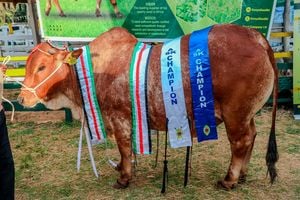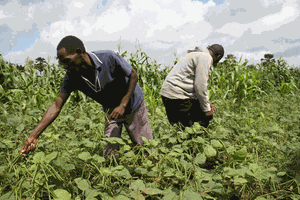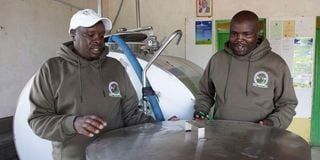
Elburgon Progressive Dairy Farmers Cooperative Society chairman Jonhstone Sang (left) and manager Daniel Kiptum.
Sometime in 2009, one hundred and twenty farmers in Elburgon came together and formed a self-help group. The decision was born out of the reality of reducing losses as middlemen took advantage of the glut and farmers’ disorganisation to buy raw milk for a song.
The self-help group then started supplying around 700 litres of milk to a local processor daily. With profits, the membership grew to around 700. It was time for the farmers to go a notch higher. They registered the Elburgon Progressive Dairy Farmers Cooperative Society in 2015.
Later, the co-op partnered with the Micro Enterprises Support Programme Trust which helped it get a grant and buy 5,000-litre and 10,000-litre coolers, a solar panel and other accessories, according to Daniel Kiptum, the manager.
The devolved government of Nakuru helped the society partner with National Rural Inclusive Growth Project in 2020.
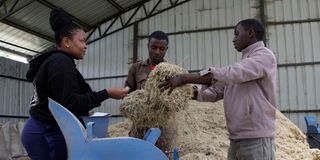
Some of the feeds formulated and packed by Elburgon Progressive Dairy Farmers Cooperative Society in Elburgon, Nakuru County.
The World Bank-supported project helps farmers improve their yields and incomes. With that, the membership of the society shot to 1,200.
“It is because of the partnership that the society has modernised. We bought a tractor, silage chopper, lab equipment, leased land for fodder and built an animal feeds centre,” Kiptum says.
The number of litres produced daily increased to 2,500 from 700, with the co-op membership hitting 1,600.
The cooperative society began selling its milk to a different processor in 2019. Payment by the new processor was prompt and based on the quality of milk received.
During a recent visit, Seeds of Gold found farmers delivering milk at the society in Karunga on the Elburgon- Njoro road.
“The previous processor took long to settle our members’ dues, meaning the co-op had to take money from banks to pay farmers,” Kiptum says.
With prompt payment, the society opened two other branches in Chandera and Muchorwi in 2022 and 2021 respectively. The membership of Muchorwi has increased from 50 to 480.
Elburgon Progressive Co-op lab technician, Emmanuel Maosa, says milk is received at the dump tank where tests for alcohol, density and organoleptic are done. The tests take 12-15 minutes.
“The sample is then taken to the lab to see if there are antibiotics, butterfat and acidity,” he says.
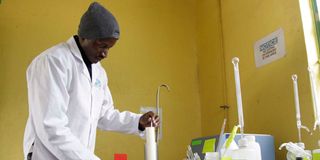
Emmanuel Maosa, a lab technician at the Elburgon Progressive Dairy Farmers Cooperative Society in Elburgon, Nakuru County.
If the milk does not meet the required standards, a rejection letter is written to the farmer.
Co-op chairman Johnstone Sang says more than 20,000 litres of milk is received from the three branches daily during peak periods – July to January – reducing to 15,000 in low seasons. Sang heads the nine-member board.
“We are the leading dairy co-op in Nakuru County as per the Ushirika Day celebrations last year,” he says, pointing at trophies.
He says the target of the society is to increase daily milk production to 30,000 litres and have more coolers.
The co-op intends to go into yoghurt, fermented milk, long life milk and butter production.
According to Kiptum, plans are on to increase branches to five, adding that operations would be fully automated.
“We request the county government to look for better markets for our milk, offer friendly credit to societies and train us on good practices,” Kiptum says, adding that the society plans to start awareness and support climate projects as corporate social responsibility.
James Kirubi, a farmer who joined the cooperative since inception, says he has been trained on improving yields and urges farmers to join such societies.
Read:
Molo Sub-County Livestock Officer, Samuel Kinyua, urges farmers to upgrade their animals through proper feeding.
“Let them grow fodder crops that contain energy, proteins, minerals and vitamins,” Kinyua says, adding that farmers need to learn to make their feed in order to reduce production costs.
Kinyua stresses on proper disease control, especially vaccinating animals against foot and mouth, anthrax, black quarter, lumpy skin and other illnesses.
He urges farmers to maintain hygiene through better housing for their animals in order to get clean milk.



